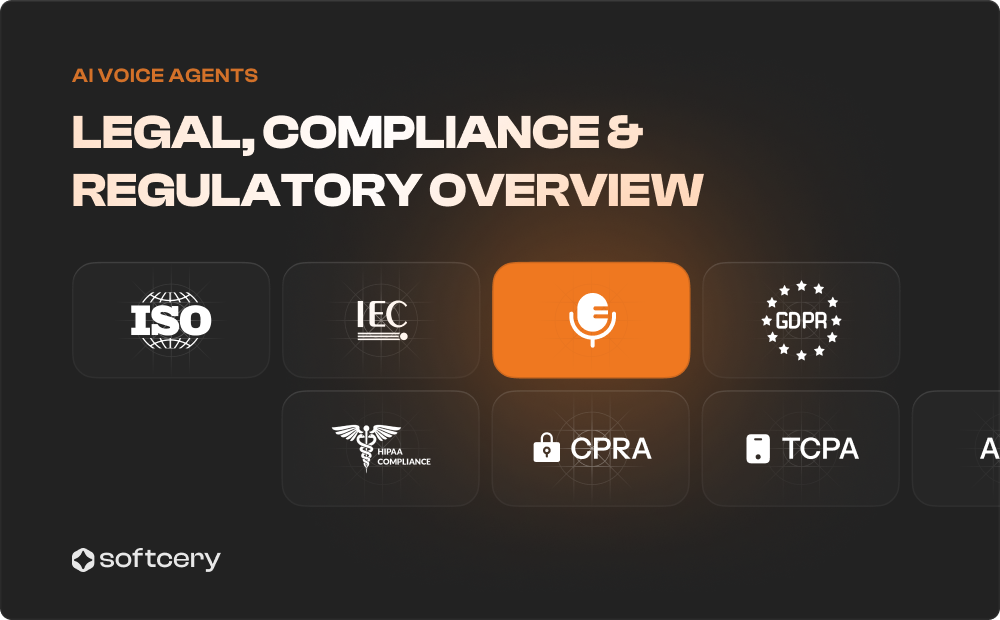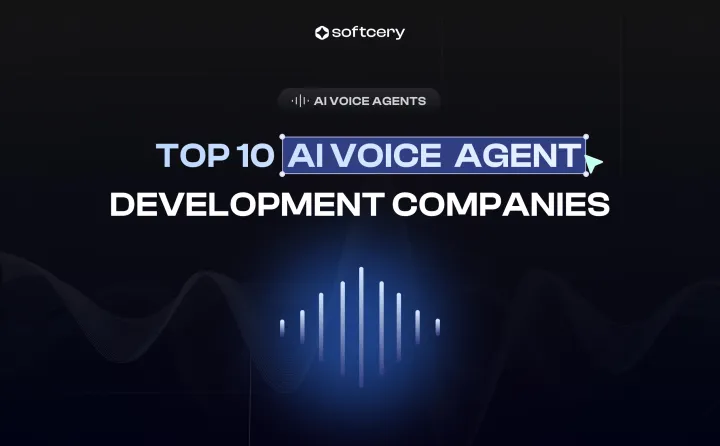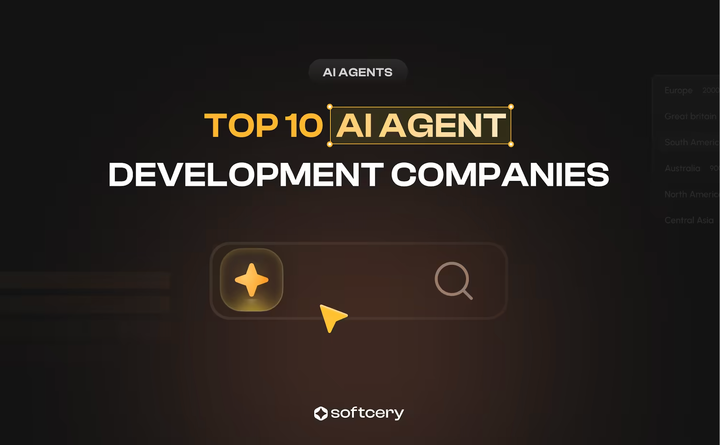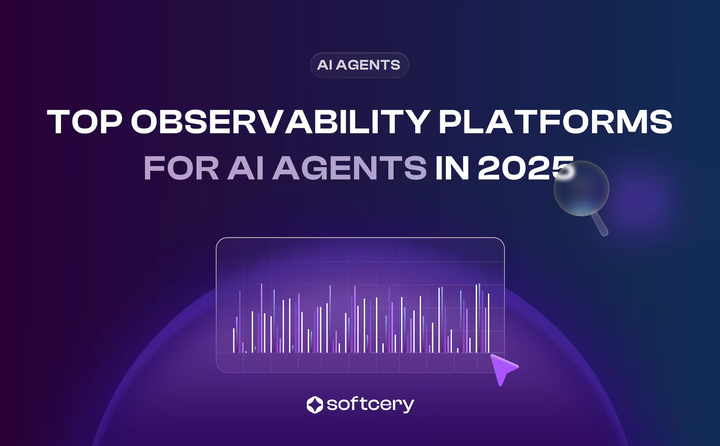
AI Voice Agents: Legal, Compliance & Regulatory Map
U.S. voice AI laws are a tangled web of FTC rules, state privacy statutes, and emerging industry standards. Here’s the overview of the regulatory landscape.
AI voice assistants are everywhere – from smart homes to call centers. But rapid growth has outpaced regulation, raising critical legal and compliance questions for teams building with voice tech. In 2023, North America led the market with 39.1% share, driven by use in customer service, scheduling tools, and smart devices. As adoption accelerates, understanding your regulatory obligations is no longer optional.
Compliance is one requirement in a larger voice agent system. Get the complete framework in our AI Launch Plan, covering architecture patterns, security controls, observability setup, error handling, and deployment strategies for shipping voice agents that meet regulatory requirements and work reliably in production.
AI standards from ISO/IEC
The International Organization for Standardization (ISO) and the International Electrotechnical Commission (IEC) have provided some guidelines for using AI, focusing on technology. ISO ethical standards that are specifically relevant to AI include:
- ISO/IEC 27001: Addresses how organizations manage the security of their information assets. For voice AI startups, this means putting systems in place to ensure only the right people access recordings or transcripts, and that the data is protected from breaches.
- ISO-IEC 31700: Sets foundational privacy principles for AI systems. It matters because it helps you design your voice agent with privacy in mind from day one – reducing rework later and helping with regulatory alignment.
- ISO-IEC 5338: Provides a framework for managing the performance and improvement of AI systems. For teams building voice agents, this supports structured monitoring and tuning of the system to maintain quality and accountability.
- ISO-IEC 42001: Lays out requirements for setting up a formal AI Management System (AIMS). Think of it as a governance blueprint – valuable if you're preparing to scale or seek enterprise partnerships where due diligence on AI oversight is expected.
Compliance with ISO-IEC standards is not mandatory but serves to enable best practices and stakeholder confidence.
ISO/IEC Certification
While compliance with ISO/IEC standards is voluntary, pursuing certification can offer strategic advantages. External third parties assess whether a system meets the standards, and a successful audit results in formal certification. This demonstrates maturity to potential partners and customers, accelerates enterprise sales discussions, and builds trust.
For early-stage teams targeting regulated sectors or enterprise clients, this can be a differentiator – signaling you're serious about security and operational excellence. That said, certification isn’t a fit for everyone. Consider whether the investment of time and resources aligns with your current stage and customer expectations before committing.
Artificial Intelligence Risk Management Framework (AI RMF 1)
Created by NIST and released in 2023, the AI RMF 1 isn’t just another policy document. It’s a practical playbook for anyone building with AI who wants to stay out of regulatory hot water while earning user trust.
Think of it as a risk compass – helping you spot what could go wrong before it actually does. For AI voice agents, that means navigating issues like biased responses, privacy oversights, or opaque decision-making that could alienate users or draw scrutiny from regulators.
The framework has two parts:
- Part 1 explains why AI risk is different from traditional software risk and sets the context.
- Part 2 dives into the “how” – showing you how to identify and manage threats like bias, security gaps, or transparency failures.
If your voice agent misinterprets input due to dialect or tone, leaks sensitive voice data, or behaves inconsistently, you need to show you had a method to detect and prevent those issues. This framework helps you do exactly that.
Key Legal Regulations
Navigating U.S. legal obligations for voice AI can feel overwhelming – but it’s mission-critical. Why? Because ignoring the wrong law can mean fines, lawsuits, or tanked partnerships. This isn’t just about avoiding trouble – it’s about building a company that earns trust from users, investors, and enterprise clients.
Global Lens: GDPR (Europe & UK)
If your AI voice system reaches EU or UK users, you must comply with the General Data Protection Regulation (GDPR). It’s one of the strictest data privacy frameworks worldwide and enforces transparency, consent, and data minimization. Even U.S. startups should take notice if they plan to expand or serve global users.
Federal Laws in the U.S.
The U.S. lacks a centralized AI law, but multiple existing statutes apply:
Federal Trade Commission Act (FTC)
The FTC enforces privacy and deception standards. If your AI voice agent gathers personal data, you must:
- Clearly explain what data you collect, why, and who it’s shared with
- Avoid misleading claims about functionality or privacy
- Secure that data against unauthorized access or breaches
Failing to comply can trigger large fines and mandatory oversight (as seen in the $25M Amazon Alexa case involving children’s data).
Children’s Online Privacy Protection Act (COPPA)
If your voice agent might be used by children under 13:
- Get verifiable parental consent before collecting any data
- Explain your data practices clearly
- Auto-delete recordings when no longer needed
Violations are treated seriously, with severe penalties.
Telephone Consumer Protection Act (TCPA)
Even if your AI voice agent isn’t “telemarketing,” automated calls using synthetic voices fall under TCPA. You need prior consent, clear identification, and an opt-out mechanism – or you risk lawsuits at $500–$1,500 per call.
Americans with Disabilities Act (ADA)
Your voice AI must be accessible. That means:
- Offering input alternatives (e.g., keypad or chat)
- Ensuring speech output is clear and understandable for users with hearing or speech impairments
ADA compliance is increasingly expected – and lawsuits are on the rise.
State-Level Regulations: CPRA and Beyond
California’s Consumer Privacy Rights Act (CPRA) set the bar for state privacy laws. It gives consumers rights to:
- Know what data is collected and why
- Delete or correct personal data
- Opt out of data sale or sharing
If your voice assistant handles user data from California – or any of the nine states with similar laws now in effect – you must support those rights. Ten more states have privacy laws taking effect in 2025–2026.
Industry-Specific Regulations
Voice AI isn’t one-size-fits-all. If your product operates in a regulated industry like healthcare or finance, you're not just building a smarter agent – you’re entering compliance-heavy territory. The stakes are higher, and the expectations sharper. Here’s where industry-specific regulations come into play:
HIPAA – Healthcare
The Health Insurance Portability and Accountability Act (HIPAA) is critical if your AI voice agent handles protected health information (PHI). This includes patient names, symptoms, diagnoses, or even appointment notes captured in audio.
Why it matters:
- Medical data is a top target for cyberattacks
- Healthcare customers will demand clear safeguards
- A breach could kill trust – and deals
Key rules:
- Privacy Rule: Limits how PHI can be used and shared
- Security Rule: Requires protection measures (encryption, access controls)
- Breach Notification Rule: Obligates you to notify authorities and affected individuals if PHI is compromised
Note: HIPAA doesn’t require a formal “certification,” but compliance is expected. A good first step? Sign a Business Associate Agreement (BAA) with partners and follow security best practices.
GLBA – Financial Services
The Gramm-Leach-Bliley Act governs how financial institutions must protect consumers’ personal financial data. If your voice AI touches banking, lending, or credit-related data, this law likely applies.
Why it matters:
- Banks will expect strict privacy and security practices
- Your system may need to support data access logs and audit trails
What’s required:
- Clear consumer privacy disclosures
- A written security program
- Vendor risk management protocols
PCI DSS – Payment Data
The Payment Card Industry Data Security Standard (PCI DSS) only applies if your AI system processes or stores credit card data.
Why it matters:
- Card data breaches trigger massive fines and PR nightmares
Most voice agents avoid this altogether, routing payments to external PCI-compliant platforms. If you do touch payment info, you’ll need strong encryption, access control, and tokenization.
BIPA – Biometric Voiceprints (Illinois)
The Biometric Information Privacy Act (BIPA) governs how biometric data like voiceprints are used in Illinois.
Why it matters:
- Voiceprint technology is increasingly used for user verification and personalization
- Class-action lawsuits under BIPA have reached hundreds of millions in settlements
To comply:
- Obtain explicit, written user consent
- Post a public policy explaining retention and deletion timelines
- Do not sell or profit from biometric data
Bottom line: If you’re building voice AI in a regulated space, compliance isn’t just a legal checkbox – it’s a growth enabler. Get it wrong, and you’re facing audits, lost deals, or worse. Get it right, and you position yourself as a trustworthy, enterprise-ready partner.
Future Legislation
As AI voice agents become more integrated into sensitive workflows, future legislation is starting to focus not just on data handling – but on how AI actually behaves. One key proposal, the Algorithmic Accountability Act, would require companies to assess the impact of their automated decision systems, especially around fairness, privacy, and bias.
If passed, this could mean mandatory audits for voice agents that screen candidates, prioritize support tickets, or determine user eligibility – essentially anything with real-world consequences. Expect to see requirements like:
- Impact assessments before deploying new features
- Public reporting on system risks
- Corrective actions for biased or opaque behavior
Meanwhile, several states (including California, New York, and Colorado) are drafting their own AI-specific bills. These could add rules around consumer disclosures, algorithmic fairness, and transparency.
Startups building in this space should monitor these developments closely. Being proactive – auditing your AI solutions now, documenting your decisions, and engaging in ethical design – could save you time, reputation, and rework later.
Recommendations
- Implement strong security controls – Encrypt all voice data in transit and at rest, enforce access control with least privilege, and require multi-factor authentication.
- Educate and train your team – Make compliance second nature. Everyone touching voice agent systems should know data privacy basics, regulatory obligations, and what to do in a breach scenario.
- Establish regular audits and monitoring – Don’t just build it and forget it. Continuously log, test, and audit your systems to catch risks before they spiral.
- Review and refine data practices – Stick to data minimization. Collect only what’s essential, set sensible retention policies, and communicate them clearly.
- Adopt industry-standard tools and frameworks – Where possible, lean on SOC 2-aligned systems, use ISO/IEC guidelines as a baseline, and embed NIST’s AI RMF for proactive risk handling.
- Be radically transparent with your users – Create accessible, jargon-free privacy policies and consent notices. Clear language builds trust – and protects you legally.
- Design for consent and control – Give users meaningful choices over how their data is used. Implement opt-ins, opt-outs, and preference management as defaults.
- Track legislation and act early – Future laws will reward proactive teams. Assign someone to monitor regulatory shifts, and use early drafts as guidance for internal policy.
Teams that treat compliance as a product feature – not a bottleneck – position themselves to move faster, earn trust, and scale with confidence.
Legal compliance determines whether your voice agent can operate in regulated industries. The complete picture includes platform selection, STT/TTS configuration, LLM orchestration, observability, cost management, and scaling infrastructure. Get the full production framework in our AI Launch Plan, covering all six systems needed to ship voice agents that meet compliance requirements and handle production call volumes reliably.
About Softcery: we're the AI engineering team that founders call when other teams say "it's impossible" or "it'll take 6+ months." We specialize in building advanced AI systems that actually work in production, handle real customer complexity, and scale with your business. We work with B2B SaaS founders in marketing automation, legal tech, and e-commerce, solving the gap between prototypes that work in demos and systems that work at scale. Get in touch.



